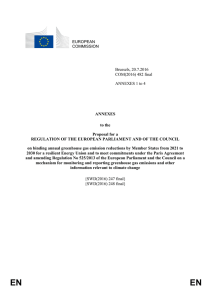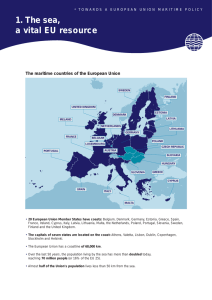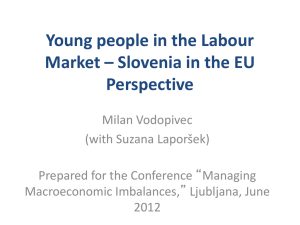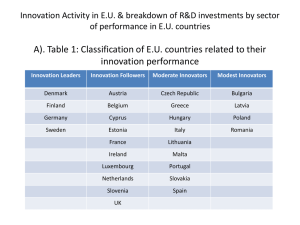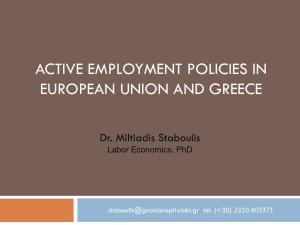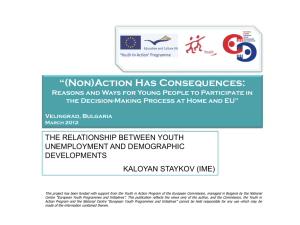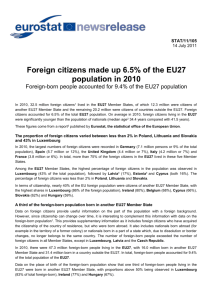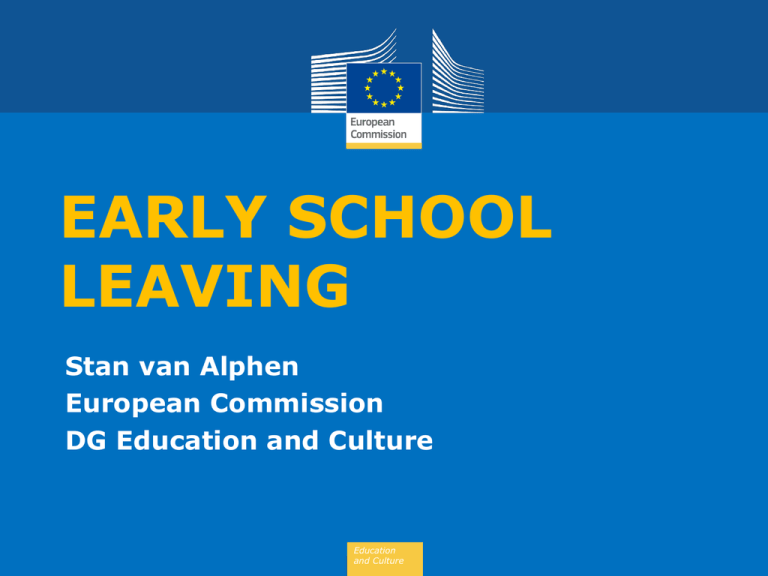
EARLY SCHOOL
LEAVING
Stan van Alphen
European Commission
DG Education and Culture
Education
and Culture
Outline of presentation
1. Early school leaving in EU policy co-ordination:
some recent updates
2. Monitoring early school leaving in DG EAC: an
improved assessment framework
3. Unemployment amongst early school leavers in
Europe: institutional education and labour
market mechanisms
Education
and Culture
EARLY SCHOOL LEAVING
IN EU POLICY CO-ORDINATION
SOME RECENT UPDATES
Education
and Culture
Europe 2020
smart,
sustainable,
inclusive growth
Reducing ESL
to <10.0% by
2020
Date: in 12 pts
Tackling early school leaving
(1)
Council Recommendation on policies to reduce
early school leaving
European Commission Communication "Tackling
early school leaving. A key contribution to the
Europe 2020 Agenda"
Education
and Culture
Tackling early school leaving
(2)
Staff working document "Reducing early school
leaving " [including good practice examples from
different EU Member States]
Conference Report: Reducing Early School
Leaving – Efficient and Effective Policies in
Europe , 1 and 2 March 2012, Brussels
Education
and Culture
Some recent developments
European Semester + CSRs
Conditionality Structural Funds
Peer learning
Peer review
Thematic Working Group
Peer Learning Activities (PLAs)
Education
and Culture
MONITORING EARLY SCHOOL
LEAVING IN DG EAC
AN IMPROVED ASSESSMENT FRAMEWORK
Education
and Culture
Early leavers from education and training
Persons aged 18 to 24 fulfilling the following two
conditions:
1. The highest level of education or training attained is
ISCED 0, 1, 2 or 3c short
2. Respondents declared not having received any
education or training in the four weeks preceding the
survey
Education
and Culture
Early leavers from education and training
2008
2009
2010
2011
2012
14.8%
14.3%
14.0%
13.5%
12.9%
-0.5
-0.3
-0.5
Education
and Culture
-0.6
EU 27
Belgium
Bulgaria
Czech Republic
Denmark
Germany
Estonia
Ireland
Greece
Spain
France
Italy
Cyprus
Latvia
Lithuania
Luxembourg
Hungary
Malta
Netherlands
Austria
Poland
Portugal
Romania
Slovenia
Slovakia
Finland
Sweden
United Kingdom
2008
14.8
12.0
14.8
5.6
12.5
11.8
14.0
11.3
14.8
31.9
11.5
19.7
13.7
15.5
7.4
13.4
11.7
38.1
11.4
10.1
5.0
35.4
15.9
(5.1)
6.0
9.8
7.9
17.0
2009
14.3
11.1
14.7
5.4
11.3
11.1
13.9
11.6
14.5
31.2
12.2
19.2
11.7
13.9
8.7
7.7 (b)
11.2
36.8
10.9
8.7
5.3
31.2
16.6
(5.3)
4.9
9.9
7.0
15.7
2010
14.0
11.9
13.9
4.9
11.0
11.9
11.6
11.4
13.7
28.4
12.6
18.8
12.7
13.3
8.1
(7.1)
10.5
36.9
10.0 (b)
8.3
5.4
28.7
18.4
(5.0)
4.7
10.3
Education
6.4
and Culture
14.9
2011
13.5
12.3
12.8
4.9
9.6
11.7
10.9
10.8
13.1
26.5
12.0
18.2
11.3
11.6
7.2
(6.2)
11.2
33.5
9.1
8.3
5.6
23.2
17.5
(4.2)
5.0
9.8
6.7
15.0
2012
12.9
12.2
12.7
5.4
9.4
10.6
11.0
10.2
12.0
25.0
11.8
17.7
11.5
10.0
6.6
8.5
11.3
31.6
8.8
7.6
5.6
21.3
17.3
4.4
5.0
8.9
6.7
14.0
target
<10.0
9.5
11.0
5.5
<10.0
<10.0
9.5
8.0
9.7
15.0
9.5
15.0-16.0
10.0
13.4
<9.0
<10.0
10.0
29.0
<8.0
9.5
4.5
10.0
11.3
5.0
6.0
8.0
<10.0
:
Portugal
Spain
Malta
Latvia
Denmark
United Kingdom
Estonia
Greece
Austria
Netherlands
Cyprus
Bulgaria
Italy
EU 27
Sweden
Germany
Ireland
Slovakia
Finland
Lithuania
Slovenia
Hungary
Czech Republic
Belgium
France
Croatia
Poland
Luxembourg
Romania
-3.5
-3.0
-2.5
-2.0
-1.5
Education-1.0
and Culture
-0.5
0.0
0.5
Portugal
Spain
Malta
Latvia
Denmark
United Kingdom
Estonia
Greece
Austria
Netherlands
Cyprus
Bulgaria
Italy
EU 27
Sweden
Germany
Ireland
Slovakia
Finland
Lithuania
Slovenia
Hungary
Czech Republic
Belgium
France
Croatia
Poland
Luxembourg
Romania
-3.5
-3.0
-2.5
-2.0
-1.5
Education-1.0
and Culture
-0.5
0.0
0.5
Malta
Spain
Portugal
Italy
Romania
United Kingdom
EU 27
Bulgaria
Belgium
Greece
France
Cyprus
Hungary
Estonia
Germany
Ireland
Latvia
Denmark
Finland
Netherlands
Luxembourg
Austria
Sweden
Lithuania
Poland
Czech Republic
Slovakia
Slovenia
Croatia
35.0
30.0
25.0
20.0
15.0
10.0
5.0
0.0
Education
and Culture
Malta
Spain
Portugal
Italy
Romania
United Kingdom
EU 27
Bulgaria
Belgium
Greece
France
Cyprus
Hungary
Estonia
Germany
Ireland
Latvia
Denmark
Finland
Netherlands
Luxembourg
Austria
Sweden
Lithuania
Poland
Czech Republic
Slovakia
Slovenia
Croatia
35.0
30.0
25.0
20.0
15.0
10.0
5.0
0.0
Education
and Culture
Malta
Spain
Portugal
Italy
Romania
United Kingdom
EU 27
Bulgaria
Belgium
Greece
France
Cyprus
Hungary
Estonia
Germany
Ireland
Latvia
Denmark
Finland
Netherlands
Luxembourg
Austria
Sweden
Lithuania
Poland
Czech Republic
Slovakia
Slovenia
Croatia
35.0
30.0
25.0
20.0
15.0
10.0
5.0
0.0
Education
and Culture
Education
and Culture
Education
and Culture
UNEMPLOYMENT AMONGST EARLY
SCHOOL LEAVERS IN EUROPE
INSTITUTIONAL EDUCATION AND LABOUR
MARKET MECHANISMS
Education
and Culture
The focus of this study
The effect of early school leaving on one's
unemployment risk –
Current unemployment
Previous unemployment
Recurring unemployment
Education
and Culture
Contextual factors
A multilevel analysis to assess the influence of
various contextual factors –
Related to the different education and
training systems across Europe
Related to the different labour market
policies across Europe
Education
and Culture
The data
European Social Survey – three waves of
repeated cross-sectional data from 20
countries
Holding constant multiple
individual-level factors (e.g.
sex, age, migrant status,
living situation)
Education
and Culture
The comparison
group
2.1
(at least upper
secondary education)
7.0
25.9
65.1
Never unemployed
Previously unemployed but not currently
Currently unemployed but not previously
Recurringly unemployed
Education
and Culture
The early school
leavers
(at most lower
secondary education)
14.9
3.3
51.4
30.4
Never unemployed
Previously unemployed but not currently
Currently unemployed but not previously
Recurringly unemployed
Education
and Culture
Country
level
Educational system
Stratification
Individual
level
Early school
leaving
Education
and Culture
Vocational
Unemployment
Country
level
Labour market policy
Active LMP spending
Individual
level
Early school
leaving
Education
and Culture
Strict EPL
Unemployment
Further research
Longitudinal design
More/different countries
Other contextual factors
Post-crisis
Education
and Culture
Policy implication?
A positive message: labour market
intervention, aimed at helping the lowest
educated individuals to build bridges towards
stable employment, can greatly decrease their
relative unemployment risks
Education
and Culture
Stan.VAN-ALPHEN@ec.europa.eu
More information on early school leaving
http://ec.europa.eu/education/schooleducation/leaving_en.htm
Education and Training Monitor 2012
http://ec.europa.eu/education/lifelonglearning-policy/monitor12_en.htm
Education
and Culture

